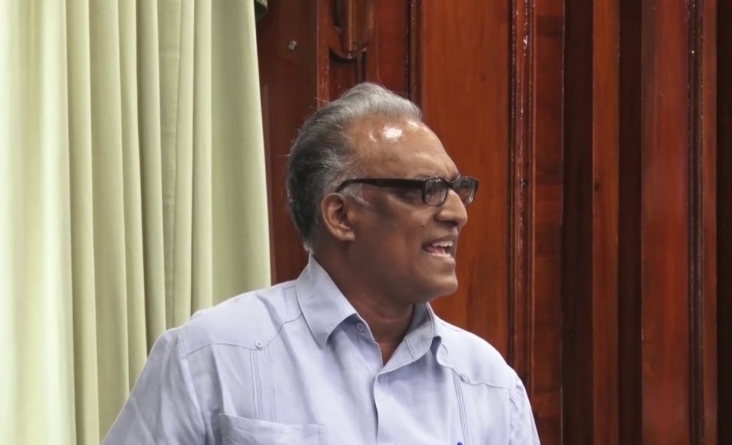We must strengthen our regional, local government systems to match our development evolution
Dear Editor,
GUYANA as a country is poised to take off, given the recent oil-and-gas productivity, the accompanying massive international investors’ interest, and the domestic expansion into food productivity guarantee areas on which the government has embarked for which we must ready also our people. Growth and development are likely to spiral exponentially for the benefit of all Guyanese if we as a nation can work in unison within our democratic framework. Given the massive March 2020 Elections dilemma which threatened all the foregoing possibilities, it is critical and necessary that we use an appropriate review of our electoral system to simplify and make more equitable, several problematic issues that lend themselves as major threats. The situation allowed the fertilisation of ethnic strife to overwhelm revered constitutional ideals and the aggrandisement of personalities interested in greed-seeking power to overcome the bigger picture for our dear country.
In the case of the structure and formula for the regional elections, the current list of electors for some regions are extremely disproportionate to the representation and service offered per capita and distorts the true impact of public policy for all citizens in the region. In Region Four for example, thousands of citizens who cast their votes for the Region Four list of regional candidates are not the actual beneficiaries of the regional system of service and governance. This is given that the Georgetown municipality performs this role for those in Georgetown who find themselves falsely influencing which party representative should provide service to the areas outside of this central domain in Region Four.
The situation is replicated in areas such as Region 10, where the heavy, central-based municipality voters, impacts the determination of representatives of those dwelling in the riverine expanses of the region, although many of the elected representatives neither dwell in, or may have never even travelled to the various regions. The egregious situation, therefore, neither establishes an effective balance of economic support or distribution of resources while political orchestrators often manipulate and take advantage of the false, ineffective representation.
It is the rational belief of many that the usefulness of this approach has been outlived with the rise in population and slow urban expansion that is now on the threshold of change. The time has come to divorce the major municipalities from the regional cover in considering a more effective regional formula. If Georgetown and Linden voters are to be instructive in determining who represents Regions Four and 10 respectively, consideration must be given to these townships falling under the direct responsibility of the regional administrative councils.
It is noteworthy the deliberate roles played by clearly contaminated GECOM operatives to strategically manoeuvre around the bumps and pitfalls. The Keith Lowenfield and Clairmont Mingo et.al. fiasco has been woefully exposed, particularly by the delays in the counting of Region Four votes, as well as increasing occasions of the gerrymandering of constituency boundaries outside of the major municipalities to create advantages for the PNC.
Regarding the local government system, there is an oversight relationship between the Regional Democratic Councils (RDCs) and the Neighbourhood Democratic Councils (NDCs) and Village Councils, although the latter two have limited independence concerning accountability for financial expenditure. The reporting role of the overseers and village leaders to the Local Government Commission and the Ministry of Local Government is instructive in this respect. However, the performances of many of these councils have been sub-optimal, with some lacking the capacity to enforce the applicable laws and by-laws. Others have suffered from vagaries and vastitudes beyond the control of the councils, necessitating a total relook regarding approaches to strengthen them. The role of GECOM in the three-year cycle of running off elections to determine new councils will also have an impact, given the loss of credibility of key officials in the secretariat of the institution.
Worthy of note is the fact that the Ministry of Local Government as required by the applicable laws, is presently running off annual elections for Neighbourhood Democratic Councils for the determination of chairmen and vice-chairmen. This is a clear message across the country that we should have local government elections when they are due, thereby upholding the democratic pillars of allowing citizens to have a definitive say in their community development. Important in this regard is the fact that the elected councillors are particularly constituency councillors and although we have the party system, there are clear cases that some candidates win because of their popularity. Hence, in all NDCs for effectiveness, it is teamwork that matters most in creating the synergies necessary in supporting the leadership roles of chairmen and vice-chairmen. This is pivotal for cohesion and development in the communities and to springboard community benefits and a legacy that people will forever talk good about.
The role of GECOM in the scheduled 2021 local government elections is a huge question, given the catastrophe of the March 2020 General and Regional Elections. It is heartening to know that the PPP/C government has announced that it will budget funds for the holding of these elections. The fact that no firm action has been taken by the chairperson and commissioners regarding those GECOM staff who have publicly demonstrated their unworthiness of continued employment at the organization, is extremely perplexing. It is of significant concern that we are now witnessing a plethora of GECOM advertisements in the widely circulated dailies concerning local government elections, while the PPP/C commissioners at the commission have not been a part of any of the approving discussions. It is quite disgusting and objectionable that GECOM may be attempting to repeat the build-up to the March 2020 elections. Hopefully, it is not the contaminated CEO and PNC commissioners again making all the decisions. GECOM must not again administer elections with the same staff, particularly those in the GECOM Secretariat who are currently facing serious charges for electoral fraud.
The Chief Elections Officer Keith Lowenfield must be removed from GECOM without any delay. The nation is looking on to see if he will be part of the transactions of the many “advertisements” in the news media. The five-month vicious ordeal that GECOM staff, particularly Keith Lowenfield took this nation through must never be erased from our memory. The is the time to quickly resolve the intolerable situation at GECOM and commence all necessary reforms. Why is this nation waiting on the ‘forensic” audit of GECOM’s financial transactions over the last seven years? Why we cannot have an audit of GECOM staff? The operational activities at GECOM must be transparent and accountable! We must strengthen both the regional and local government systems to match our likely expansive growth and development.
Yours sincerely,
Neil Kumar






















